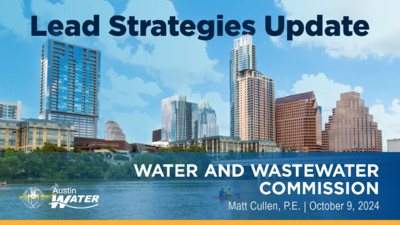Item 9 Lead Line Inventory Presentation — original pdf
Backup

LEAD UPDATE Agenda 1. Background/Austin’s history 2. EPA’s Lead and Copper Rule Revisions and Improvements (LCRR & LCRI) 3. Service Line Inventory & Replacement Work 4. Federal Funding for Lead Related Work 5. School and Child Care Facility Education and Sampling Lead Background & Austin’s History Why lead matters Austin’s measures to limit lead exposure • 1954 local plumbing code prohibited use of lead on public side of the meter • 1967 local plumbing code prohibited use of lead on both sides of meter • AW’s efforts in the 1960’s to replace public lead services • AW’s treatment processes By contrast, some major utilities required the use of lead pipe until the EPA’s lead ban in 1986 The original Lead and Copper Rule – 1992 Renewed focus following the crisis in Flint, Michigan led to the Lead and Copper Rule Revision (LCRR) and the Lead and Copper Rule Improvement (LCRI) EPA’s Lead and Copper Rules Goal: Further reduce exposure to lead in drinking water LCR Revisions (LCRR) effective December 16, 2021 | Compliance date October 16, 2024 LCR Improvements (LCRI) proposed December 6, 2023 will overwrite many LCRR details • Final publication expected by October 16, 2024 | Compliance date anticipated for 2027. LCRR deliverables due October 16, 2024 • Service Line Inventory, made publicly available • Notice to customers served by higher risk lines within 30-days (by November 15, 2024) LCRI is expected to postpone mandatory school & child care facility (CCF) sampling and remediation programs outlined in LCRR, however voluntary state programs are active now Service Line Inventory Inventory public & private materials at each meter Categorize each service lines as: • Lead status unknown • Lead • Non-lead • Galvanized Requiring Replacement (GRR) Completed, submit to TCEQ by October 16, 2024 All service lines are “non-lead” or “galvanized requiring replacement” Public ownership and responsibility Private ownership and responsibility Total of 256,735 services in AW’s System 777 GRR Service Line Inventory • Non-lead due to age – 203,630 • Non-lead due to field investigation – 52,328 • Galvanized Requiring Replacement (GRR) – 777 • No lead and no unknowns Full inventory due online and to TCEQ by October 16, 2024 Map of inventory will go live October 9 255,958 Non-lead Service Line Inventory Map Water Service Line Inventory Map (arcgis.com) Galvanized Requiring Replacement Public ownership and responsibility Private ownership and responsibility GRR is defined as galvanized line that is or ever was downstream of lead pipe • Public side was never downstream • Private side may have been long ago LCRR requirements regarding GRR • Notify customers with GRR services on an annual basis. (AW has none) • Utilities must replace GRRs they own • Encourage customers to replace their GRRs. Galvanized Requiring Replacement Notice of “Galvanized Requiring Replacement” Service Line Status This notice contains important information about your drinking water. Please share this information with anyone who drinks and/or cooks using water at this property. AW Plan • Notify customers with GRRs as the LCRR requires. • Offer to replace the services for the customer directly or by rebate. (Estimated $5,000 each, $5 million total cost) • Continue to notify customers on an annual basis if they still have a GRR service line. Federal Funding for Lead Related Work Funding was allotted in the 2021 Bipartisan Infrastructure Law through the Drinking Water State Revolving Fund AW submitted a Project Information Form to Texas Water Development Board (TWDB) for the galvanized service replacement program, but the project was not selected. AW continuously analyzes projects for potential funding from this program. AW is tracking costs for developing inventory, future school and childcare sampling, and potential galvanized service replacements. School & Child Care Facility (CCF) Activities Ahead of regulatory requirements, AW is… Maintaining a compiled list of schools & CCFs served by Austin Water Tracking service line risks for these facilities • Previous research found no lead pipe in service lines to schools or CCFs Promoting free voluntary program for lead testing available by TCEQ • Open to all public schools & CCFs • Includes extensive training, comprehensive testing, and intervention resources • AISD, Manor ISD and at least 84 CCFs have enrolled School & Child Care Facility (CCF) Activities Minimum obligations expected October 2027 according to proposed LCRI: Provide education materials to all schools and licensed CCFs Coordinate & schedule sampling of all elementary and CCFs over 5 years • 5 samples per school and 2 samples per CCF if built prior to 2014 AW to receive regulatory credit for schools and CCF’s completing TCEQ’s testing program Lead Webpage and Customer Requested Lead Sampling AW Lead info page at: www.austintexas.gov/lead Features an interactive map of the service line inventory reimbursement. Allows customers to request GRR replacement or SC A N TO VISIT Includes contact information to request testing for AW customers, as well as schools/CCFs via TCEQ Summary AW customers are at very low risk of exposure to lead through water: • Lack of lead services in AW’s system and in private plumbing • AW’s treatment and water characteristics • Preliminary testing of highest risk sites under the new rule are all non-detect for lead. AW is well positioned to be in compliance with the LCRR and LCRI ahead of schedule: • Currently providing testing on an as-requested basis in addition to required routine testing • Service line inventory complete • Program to replace private GRRs underway • Utilizing TCEQ program & preparing for AW school and CCF sampling program Glossary of Acronyms CCF – Child Care Facility EPA – Environmental Protection Agency GRR – Galvanized Requiring Replacement LCRI – Lead and Copper Rule Improvement LCRR – Lead and Copper Rule Revision PIF – Project Information Form TCEQ – Texas Commission on Environmental Quality TWDB – Texas Water Development Board